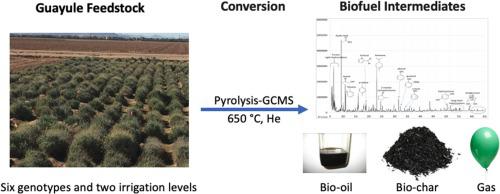Industrial Crops and Products ( IF 5.6 ) Pub Date : 2020-07-23 , DOI: 10.1016/j.indcrop.2020.112810 Zinan Luo , Charles A. Mullen , Hussein Abdel-Haleem

|
In addition to the commonly known use as an alternative source for natural rubber and hypoallergenic latex, guayule could also be a source of resin and bagasse for use in the pharmaceutical and biofuel industries. Pyrolysis is a method to convert guayule biomass into liquid (condensable gas or bio-oil), which can be an intermediate towards production of biofuels and/or renewable chemicals. In this work, six guayule genotypes that were planted under either well-irrigated or reduced-irrigation conditions were pyrolyzed using a pyrolysis gas-chromatography-mass spectrometry instrument (PY-GC/MS). The products included condensable gas, non-condensable gas and bio-char. Within the condensable gases, selected compounds were divided into nine chemical classes including aromatic hydrocarbons, alkyl phenols, guaiacols, syringols, furans, cyclopentenones, acetic acid and acetol, levoglucosan and limonene groups. As a result, significant variations were observed in the major compounds and prominent sub-constituents of condensable gas among the studied guayule genotypes and under irrigation levels. Strong positive correlations were found between irrigation levels and oxygenated condensable gas components derived from cellulose and lignin, although hydrocarbon components derived from the rubber and resin were found to be negatively correlated with irrigation levels. Results indicated that the genetic variations among guayule genotypes can be used to improve its bioenergy potential, and positive correlations observed among pyrolysis byproducts suggest the possibility to improve several byproducts simultaneously in guayule breeding programs. This research gives an insight to breed for guayule as an economic crop with high bioenergy potential for the development of sustainable agriculture.
中文翻译:

改良愈创木瓜基因型的热解GC / MS分析
除了通常用作天然橡胶和低变应原性胶乳的替代来源外,番石榴油还可以用作制药和生物燃料工业中使用的树脂和蔗渣的来源。热解是一种将愈创木瓜生物质转化为液体(可冷凝气体或生物油)的方法,该方法可以作为生产生物燃料和/或可再生化学物质的中间体。在这项工作中,使用热解气相色谱-质谱仪(PY-GC / MS)对在良好灌溉或减少灌溉条件下种植的六种愈创木瓜基因型进行了热解。产品包括可凝性气体,不可凝性气体和生物炭。在可冷凝气体中,选定的化合物分为9种化学类别,包括芳烃,烷基酚,愈创木酚,丁香酚,呋喃,环戊烯酮,乙酸和丙酮醇,左旋葡聚糖和柠檬烯基团。结果,在研究的愈创木瓜基因型和灌溉水平下,可凝性气体的主要化合物和重要的次要组成成分之间存在显着差异。尽管发现源自橡胶和树脂的碳氢化合物组分与灌溉水平呈负相关,但灌溉水平与衍生自纤维素和木质素的氧化可冷凝气体组分之间却存在强的正相关关系。结果表明,愈创木瓜基因型之间的遗传变异可用于提高其生物能源潜力,并且在热解副产物之间观察到的正相关性表明,在愈创木瓜育种程序中可以同时改善几种副产物。

































 京公网安备 11010802027423号
京公网安备 11010802027423号